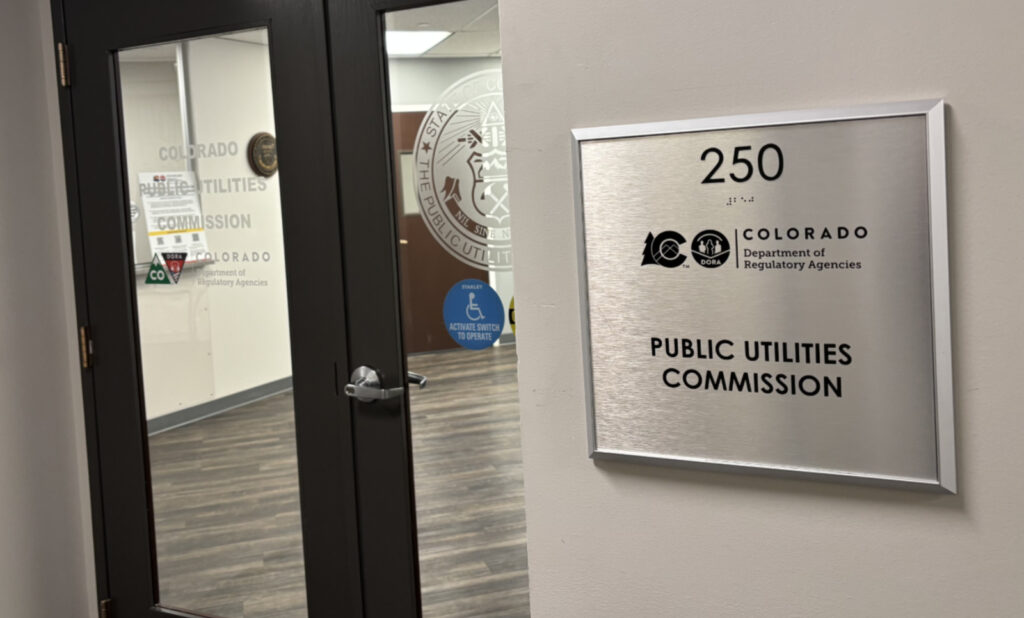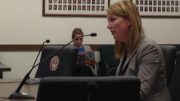By Jeffrey A. Roberts
CFOIC Executive Director
Members of the Public Utilities Commission should be allowed to communicate with one another outside of public meetings because the Colorado Open Meetings Law “stymies brainstorming and discussion” and may also “inhibit the efficiency” of drafting decisions, a state agency says.
The recommendation is in an Oct. 15 report from the Colorado Office of Policy, Research & Regulatory Reform, issued for the legislature’s 2026 sunset review of the PUC.

“The intent of the Open Meetings Law is to ensure that public business is transacted in public, open to public scrutiny and observation,” the report says. “It is a laudable goal, but in the case of the Commission, it may impede the timeliness and quality of decision-making.”
Because the three-member PUC is a state public body, a meeting of two or more members concerning public business is subject to the requirements of the open meetings law. Ever since voter approval of the Colorado Sunshine Act of 1972, such discussions have been “declared to be public meetings open to the public at all times.”
“Full and timely” notice to the public is required for meetings at which the adoption of a policy or position occurs or at which a majority or quorum of the body attends or is expected to attend. Minutes must be “taken and promptly recorded.”
The sunset review report says the PUC “strictly adheres” the open meetings law. But during the review process, “multiple stakeholders expressed frustration at the length of time it can take the Commission to make a decision on certain matters. Some of this may be, at least in part, attributable to the Open Meetings Law requiring that substantive discussions among Commissioners about matters for decision be conducted only in open public meetings.”
“This requirement stymies brainstorming and discussion, as Commissioners are required to respond in real time to new proposals and may be reluctant or unprepared to talk through highly technical matters for fear of saying something that is ‘outside of the box’ in an open public meeting,” the report adds.
The open meetings law also may “inhibit the efficiency with which Commission decisions are drafted,” the Office of Policy, Research & Regulatory Reform says. “While one Commissioner may draft the decision for circulation to the other two, none can see the others’ comments. Instead, if a Commissioner has a question about a drafted section or addition, the decision language would be discussed again publicly. This makes for a lengthy and awkward drafting process.”
The policy office, which is part of Department of Regulatory Agencies, suggests that “one solution” would be to mirror the process used by the New Mexico Public Regulation Commission. Exempted from New Mexico’s open meetings law are “deliberations by a public body in connection with an administrative adjudicatory proceeding.” For New Mexico’s commission, the sunset report says, “closed deliberations can only occur after the evidentiary record closes, only upon notice and can only include commissioners, their advisors and counsel.”
The PUC defines adjudicatory proceedings to mean “applications, petitions, other than petitions for rulemaking, formal complaints, show cause proceedings, and advice letter proceedings after suspension of the effective date by the Commission.”
The sunset report, which will be considered by state lawmakers, emphasizes that “any efforts to allow the Commissioners to deliberate on adjudicatory matters outside of a public meeting must be accompanied by stringent safeguards.” Such safeguards would include public notices of any discussions not held in public — listing those involved as well as the time, place and subject matter.
A subsequent public meeting of the commissioners would be required “to capture their final reasoning and determination.”
“Some may fear that one or two Commissioners might try to persuade the others to their point of view or make some kind of political deal,” the report says. “While these fears have merit, the Commissioners being required to speak publicly about their decision after the private meeting should mitigate those concerns.”
The Colorado Freedom of Information Coalition has not yet taken a position on the proposed open meetings law exception.
Follow the Colorado Freedom of Information Coalition on X (formerly Twitter) @CoFOIC. Like CFOIC’s Facebook page. Do you appreciate the information and resources provided by CFOIC? Please consider making a tax-deductible donation.




